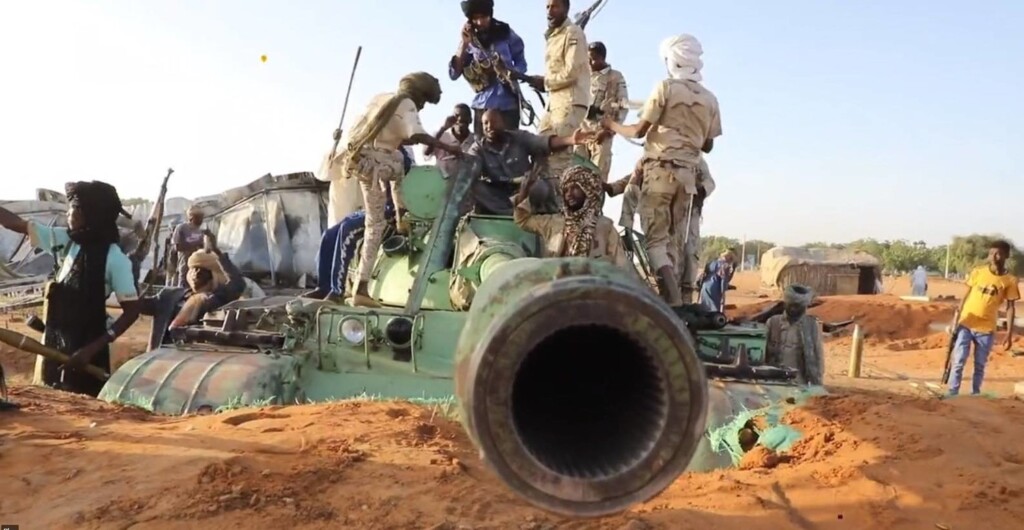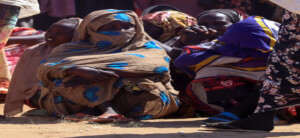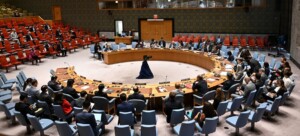Sudan war: East Darfur SAF base ‘falls to RSF’

At tank at the base of the 20th Infantry Division in Ed Daein, capital of East Darfur, on Tuesday (Video screenshot: RSF)
The Rapid Support Forces (RSF) claim to have taken control of the base of the 20th Infantry Division in Ed Daein, capital of East Darfur, at dawn yesterday. The Sudan Armed Forces (SAF) withdrew from the 20th Infantry Division base” without resistance” according to the RSF announcement yesterday.
Residents told Radio Dabanga that the 20th Infantry Division base in Ed Daein faced aerial bombardment on Tuesday morning, after the RSF took charge of the East Darfur capital’s army garrison. Dozens were killed and injured in the process, local sources said. The RSF seized the division headquarters “along with all its weapons and equipment”, they added.
According to local accounts, Ed Daein has witnessed widespread plundering since the takeover, “particularly at its gates”. Gunmen in civilian clothing were seen deployed in the market, allegedly for protection, but nevertheless causing a state of terror and panic among residents. Shops remain closed in Ed Daein.
A journalist from East Darfur said there is continued displacement from neighbourhoods near the 20th Division’s base towards safer areas, with many fleeing Ed Daein entirely. The journalist warned of a significant rise in fuel prices.
On Sunday, the RSF took control of the Abu Sufyan oil field in Abu Karinka, East Darfur. Local sources reported “widespread plundering of facilities and properties in the field”. The RSF’s control extended to the 82nd Infantry Brigade in Adila, where further reports of plundering emerged. Radio Dabanga listeners in Abu Karinka confirmed SAF’s withdrawal from the garrisons of Abu Karinka and Adila.
The RSF accused the SAF of bombing World Food Programme (WFP) warehouses in Ed Daein and the Zarga Um Hadid oil field in East Darfur. Mousa Khaddam, advisor to the RSF commander, stated in an interview with Radio Dabanga that the RSF intends to appoint a sector commander in East Darfur to “oversee security”. He urged civil society and the Native Administration* to form civil and security committees, emphasising that security is the RSF’s responsibility.
With the RSF now in control of Ed Daein, they have claimed four Darfur states and parts of North Darfur. After the RSF took control of Nyala and Zalingei in end October, and El Geneina earlier this month, the focus on Ed Daein and El Fasher is seen as part of an effort to expand territorial control, potentially enhancing negotiation leverage in the Jeddah talks.
Amid rumours of an imminent RSF attack on El Fasher, Khaddam refused to disclose military plans, but asserted that RSF forces “target army headquarters and not cities”. He reaffirmed the RSF’s commitment to the Juba Peace Agreement, countering accusations of seeking to fragment Sudan. Khaddam stressed the RSF’s goal of “comprehensive civil transformation and full federal rule for the entire country”.
Last week, the Sudan Liberation Movement under leadership of Minni Minawi (SLM-MM) and the Justice and Equality Movement (JEM) led by Jibril Ibrahim, said they will abandon the neutrality pledged as part of the Juba Peace Agreement, and enter the fray in support of the SAF.
*The Native Administration was instituted by British colonial authorities seeking a pragmatic system of governance that allowed for effective control with limited investment and oversight by the state. The state-appointed tribal leaders also took on new responsibilities for executing policies, collecting taxes, and mobilising labour on behalf of the central government. According to the Darfur Bar Association (DBA), the Native Administration during the 30-year rule of dictator Omar Al Bashir did not represent the real local leaders.











 and then
and then